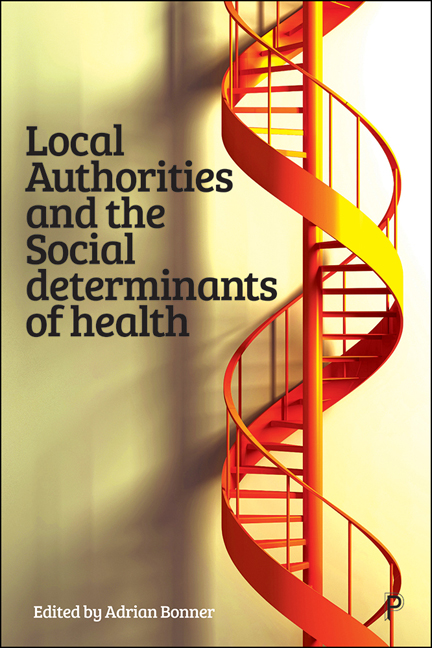Book contents
- Frontmatter
- Dedication
- Contents
- List of Figures, Tables and Boxes
- Notes on Contributors
- Acknowledgements
- Foreword
- Summary
- Introduction: Key Sociopolitical Changes Affecting the Health and Wellbeing of People
- Part I Health, Social Care and Community Wellbeing
- Part II The Role of Local Authorities in Promoting Health and Wellbeing in the Community
- Part III Local Authority Commissioning
- Part IV The Third Sector
- Part V Socio-Economic Political Perspectives
- Conclusion
- Appendix: COVID-19 Timeline
- Index
18 - From Front-Line Defence to Back-Foot Retreat: The Diminishment of Local Government’s Role in Social Health Outcomes
Published online by Cambridge University Press: 25 March 2021
- Frontmatter
- Dedication
- Contents
- List of Figures, Tables and Boxes
- Notes on Contributors
- Acknowledgements
- Foreword
- Summary
- Introduction: Key Sociopolitical Changes Affecting the Health and Wellbeing of People
- Part I Health, Social Care and Community Wellbeing
- Part II The Role of Local Authorities in Promoting Health and Wellbeing in the Community
- Part III Local Authority Commissioning
- Part IV The Third Sector
- Part V Socio-Economic Political Perspectives
- Conclusion
- Appendix: COVID-19 Timeline
- Index
Summary
When I first came to consider local government, I began to see how it was in essence the first-line defence thrown up by the community against our common enemies – poverty, sickness, ignorance, isolation, mental derangement and social maladjustment. The battle is not faultlessly conducted, nor are the motives of those who take part in it all righteous or disinterested. But the war, I believe, is worth fighting. (Winifred Holtby, in a letter to her mother, Alderman Alice Holtby, 1935)
Introduction
Modern local government in the United Kingdom (UK) was born out of a growing concern about the links between social conditions and the state of public health. Yet while ‘social determinants of health’ has become a global discipline, local government has ceded its role over the last decade as its capacity has withered during the time of austerity. The COVID-19 crisis of 2020 has shown the capacity of local government to mobilise anew around public health issues, but its fundamental fiscal and constitutional weaknesses show that a new settlement is needed more than ever.
The story of local government and public health
One way of interpreting the last 150 years of English local government is through the lens of inequality and wellbeing – or what we are now calling the social determinants of health. As the Industrial Revolution developed and England grew wealthier, the health and welfare of its workers deteriorated. Between 1801 and 1841, the population of London doubled and that of Leeds nearly tripled. But such growth in urbanisation was deadly. Between 1831 and 1844, the death rate per 1,000 increased in Birmingham from 14.6 to 27.2, in Bristol from 16.9 to 31 and in Liverpool from 21 to 34.8 (Bryant and Rhodes, 2019). This crisis was the result of a terrible mismatch between the increase in the urban population and available housing. Overcrowding and poor living conditions led to widespread disease and poor health.
The shock of these negative effects on public health led to significant sanitary reforms in the 19th century and subsequently to the establishment of public health institutions.
During the 19th century, the new and growing cities and towns gained powers from Parliament to create municipal corporations (citybased all-purpose councils) with significant powers of taxation. By 1900, ‘most public provision was in the hands of these councils or special-purpose authorities.
- Type
- Chapter
- Information
- Local Authorities and the Social Determinants of Health , pp. 347 - 364Publisher: Bristol University PressPrint publication year: 2020



